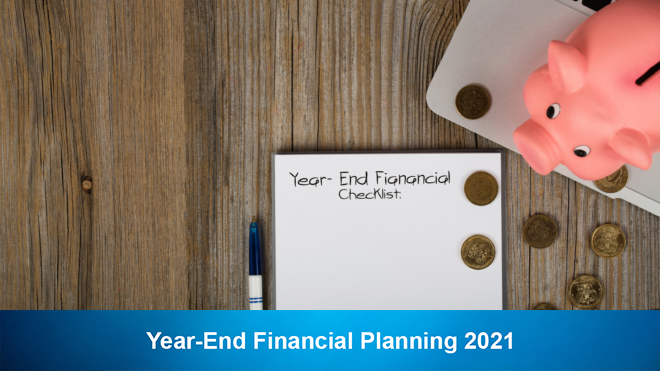With the penultimate month of the year right around the corner, there are several significant financial deadlines fast approaching. Before you flip your calendar to November, consider making some of these smart money moves.
The end of the year is a great time to revisit your finances and build a plan for next year. For some, this year may have brought changes to your financial plan. Considering the unusual circumstances of the past two years, it left many considering new careers and revamping their retirement saving plans.
Regardless of whether your career took a pivot or not, this is the time to recalibrate and set yourself up on firm financial footing for next year. Here are a few things to consider as part of your year-end planning.


It’s important to have a budget in place. Your budget keeps you financially accountable so you can prioritize the things that are most important to you. Revise or establish your budget by reviewing your 2021 spending and create a budget for 2022 and beyond. A financial advisor can help you build a budget as part of a broader financial plan.
If possible, replenish your emergency fund or get one started if you haven’t already. Aim to save up to three to six months’ worth of expenses in an account that you can easily access. If your family grows, or you have more assets or expenses, you might want to adjust that total amount. Having these funds in reserve can help you cover surprise expenses, such as a blown furnace or medical expense, without utilizing credit or dipping into long-term savings.


Investing is part of the strategy for building wealth and financial security. While you may not be able to access it for a couple of years, it’s important to keep your portfolio up to date. Depending on what happened in markets through the year, your portfolio’s asset allocation may no longer reflect a level of risk that’s appropriate for your goals. You may need to rebalance your portfolio to bring your investment holdings back in line with your risk tolerance and goals.
If you switched jobs this year, don’t forget to bring your old 401(k) along with you. You can transfer assets in your 401(k) into your current employer’s retirement services, or you could transfer it to your own brokerage. However, you’ll want to do this properly to ensure you aren’t hit with a tax liability for an unintentional withdrawal. If your budget allows, take advantage of the maximum allowable contribution to an IRA, 401(k) or Roth if those are available to you. The tax advantages these accounts offer can help you make your money go further over time.


November and into December is typically open enrollment time for health coverage. Make sure you set aside time to review your health plan. The 2022 Open Enrollment Period runs from Monday, November 1, 2021 through Saturday, January 15, 2022. Starting November 1st you can apply several ways:
- Online
- By phone
- With the help of someone in your community
- Through an agent/ broker
- Through certified enrollment partner websites
- With a paper application
If you have a Health Savings Account (HSA) you could top off annual contributions to maximize the triple tax advantages — money goes in tax free, grows tax free and comes out tax free for qualified healthcare expenses. If you have a Flexible Spending Account (FSA), consider spending the funds that won’t be carried over to next year as you may lose them otherwise.


Before we close out the article (and year), there are several important financial deadlines to remember. To simplify the year-end management of your finances, here are our top deadlines and cutoffs to be aware of:
November/December – Capital Gains Distributions: Mutual funds are mandated by law to distribute at least 98% of their net capital gains to shareholders once per year, typically in November or December.
Mid-December – Charitable Donations: Although the deduction structure changed with the implementation of the Tax Cuts and Jobs Act, if you itemize, you can still reduce your taxable income through charitable contributions. For many institutions, the cutoff for the current year’s contribution of appreciated securities is around mid-December.
December 31st – 529 Contributions: Donations to a child, relative or friend’s 529 account count as a gift for tax purposes, and they are currently limited to $15,000 a year, per person, to avoid paying a gift tax or having the gift count against your lifetime gift exemption. If you want to maximize the amount you are giving to a 529 each year, the cutoff is Dec. 31.
December 31st – RMDs: For those over the age of 70½, RMDs are annual withdrawals required by the IRS to be made from qualified retirement accounts. The RMD for each account is determined by the IRS based on the balance of the account as of Dec. 31 of the prior year and your age, among other factors. If you fail to withdraw your RMDs on time, you’ll be hit with a whopping 50% penalty.
December 31st – Tax Loss Harvesting: Tax loss harvesting is when you sell some investments at a loss to offset gains you’ve realized by selling other stocks at a profit. The result is that you only pay taxes on your net profit, or the amount you’ve gained minus the amount you lost, thereby reducing your tax bill. If you want to harvest losses from 2021, the transactions will have to be completed by December 31, 2021.
December 31st – Max out employer-sponsored retirement plan contributions: For all employer-sponsored retirement plans, there are annual contribution and salary deferral limits. For many pre-retirees, maximizing their contributions for the year is an important part of their retirement plan. The deadline for your annual contributions is Dec. 31.

As 2021 winds down, we are about to close the book on yet another challenging year. While we can’t predict what may happen next year, or the one after that, we can position ourselves to be as prepared as possible.
If you’re looking to set the stage for a financially successful year in 2022, schedule a meeting with your financial advisor at CKS Summit Group to review your year-end financial planning checklist. The best and highest use of our experienced financial advisors is not only to help you address many of the issues on your checklist, but also to be your financial coach for the year ahead.
Contact us here today to set up your complimentary strategy session.



